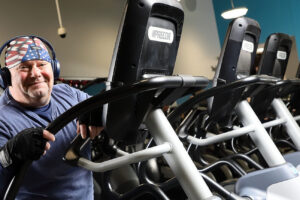When pediatrician Ramarao Gajula, MD, sought a permanent solution to his ongoing back pain, he turned to CentraState colleague Mark McLaughlin, MD.
Dr. Gajula, 67, spent a decade in pain. He suffered from lower back pain, tingling, and numbness nearly every day. While walking, he often had to sit until the pain subsided before continuing. At times he couldn’t feel his feet. It even impacted his golf game, a favorite hobby.
“It got to the point where I couldn’t take 10 steps without pain,” he says.
He was prescribed pain medication, which didn’t provide optimal relief. Then a pain management specialist recommended epidural steroid injections, but relief from those only lasted a day. His wife, a CentraState employee, suggested that he call Dr. McLaughlin, a board-certified neurosurgeon. Dr. McLaughlin determined that Dr. Gajula had spinal stenosis, a narrowing of the spine that puts pressure on the nerves. While more common in older adults, the condition can occur at any age.
A Lasting Solution
For mild cases of spinal stenosis, treatment options include physical therapy and steroid injections. For severe narrowing, spinal decompression surgery is usually recommended, particularly for those with both back and leg pain.
While Dr. Gajula knew that surgery was his best option, other physicians had warned him that the procedure would mean a long recovery.
“I hadn’t met Dr. McLaughlin before, but he assured me that if I had surgery, I’d be walking that same day,” explains Dr. Gajula. “I trusted his professional opinion.”
During the procedure, called a laminectomy, an incision is made in the back and the muscles are moved to expose the spine. The rings of the spinal canal are shaved down to relieve pressure on the nerves. Recovery usually takes two to four weeks, and some patients require physical therapy after surgery. However, Dr. McLaughlin was true to his word: Dr. Gajula felt well enough to go back to work the next day, and he was back to running on the treadmill in no time.
“Sometimes surgery is the more conservative approach instead of a lifetime of taking pills or having injections,” says Dr. McLaughlin.
“I suffered for years, but I no longer have to worry about being in pain,” says Dr. Gajula.
For more information about surgery at CentraState, visit centrastate.com/surgery or call 866-CENTRA7 (866-236-8727).





